Search the Special Collections and Archives Portal
Search Results
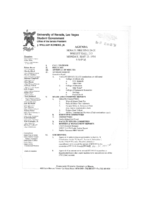
Meeting minutes for Consolidated Student Senate University of Nevada, Las Vegas, May 23, 1994
Date
Archival Collection
Description
Text
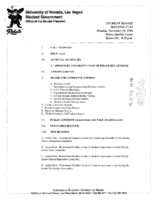
Meeting minutes for Consolidated Student Senate University of Nevada, Las Vegas, November 18, 1996
Date
Archival Collection
Description
Text

Morgan H. Mills interview, March 26, 1981: transcript
Date
Archival Collection
Description
On March 26, 1981, Matthew A. Carr interviewed Morgan Mills (b. July 27, 1914 in Grand Junction, Colorado) about his life in Boulder City, Nevada and his work at the Boulder (Hoover) Dam site. Mills speaks primarily about his time working on the dam as a mechanic with the United States Bureau of Reclamation, as a tourist guide with the Boulder City Tourist Bureau and as a musician in local bands. Moreover, Mills speaks about attending the University of Nevada, Reno and playing music there. Lastly, he talks about the Great Depression, how it affected Las Vegas and Boulder City, the development of different infrastructure and the speakeasies in Boulder City during the Prohibition era.
Text

Transcript of interview with Joan Johnson by Kim Geary, March 25, 1978
Date
Archival Collection
Description
On March 25, 1978, Kim Geary interviewed Joan Johnson (born 1911 in Oklahoma) in her home in Las Vegas, Nevada. The two discuss Joan Johnson’s personal history and her reasons for originally moving to Las Vegas. Johnson recalls early Las Vegas entertainment, as well as the development of businesses and their unions.
Text
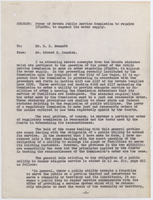
Memo from Edward C. Renwick to E. E. Bennett about the Las Vegas Land and Water Company being required to augment its water supply, 1952
Date
Archival Collection
Description
Discussion of the relevant legal issues and court decisions relating to the question of whether the railroad could be forced to increase water production
Text

Transcript of interview with Eugene Brandise by Mark Mangiaracina, March 3, 1980
Date
Archival Collection
Description
Text

Transcript of interview with Perle Garrett by Marilyn Swanson, March 2, 1975
Date
Archival Collection
Description
On March 2, 1975, Marilyn Swanson interviewed her neighbor Perle Garrett (born April 27, 1905 in Overbrook, Kansas) in her home in Boulder City, Nevada. This interview covers Boulder City during the 1930s, with special focus on the building of Boulder Dam. Mrs. Garrett relocated to Boulder City because her husband Theodore Garrett was one of the workers at the dam. She also discusses Six Companies houses, family life, the weather, churches in Las Vegas and recreational activities for local children. Her husband is also present during the interview.
Text
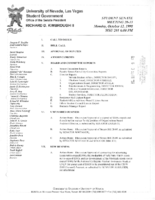
Meeting minutes for Consolidated Student Senate University of Nevada, Las Vegas, October 12, 1998
Date
Archival Collection
Description
Text
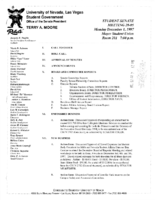
Meeting minutes for Consolidated Student Senate University of Nevada, Las Vegas, December 1, 1997
Date
Archival Collection
Description
Text
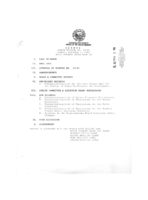
Meeting minutes for Consolidated Student Senate University of Nevada, Las Vegas, November 9, 1992
Date
Archival Collection
Description
Text
